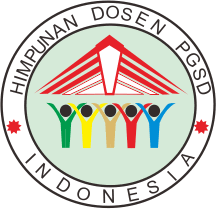Analisis kemampuan peserta didik dalam memecahkan masalah soal cerita pada materi volume bangun ruang ditinjau dari gaya kognitif
Abstract
This study aims to describe the problem solving ability of story problems with volume material based on the cognitive style of each student. This research uses a qualitative approach with descriptive methods. Sampling using purposive sampling technique on students of class V B SDN Cengklik. Data collection was done using tests, interviews, and documentation studies. The data validity test technique used was triangulation technique. Data analysis used the Miles and Huberman model technique. Based on the results of research and discussion, the score of problem solving ability in students with cognitive style field independent class V B SDN Cengklik is 98, while students with cognitive style field dependent have an average score of 54 problem solving ability. Score problem solving ability in cognitive style group field independent analyzed based on each indicator is 92, meanwhile field independent’s is 25. It shows that the problem solving ability on cognitive style field independent classified as very good, while problem solving ability in cognitive style field dependent classified as very less. Theoretically, the implications of this research enrich the understanding of problem solving ability across cognitive styles. Practically, this research helps educators in adjusting mathematics learning for each student.
Keywords
Full Text:
PDFReferences
[1] S. Arifin, K. Kartono, and I. Hidayah 2019 Analisis Kemampuan Pemecahan Masalah Pada Model Problem Based Learning Disertai Remedial Teaching Eduma Math. Educ. Learn. Teach. 8(1) 85-97
[2] H. Lestrari, T. Murwaningsih, and Supianto 2024 The Influence of Parenting Styles and Academic Self Efficacy on Mathematics Learning Achievement of Elementary Students Social Humanit. Educ. Stud. Conf. Ser. 7(1) 122-129
[3] Z. Kohen and O. Nitzan-Tamar 2022 Contextual Mathematical Modelling: Problem-Solving Characterization and Feasibility Educ. Sci. 12(7)
[4] F. R. Putri, S. Marmoah, and Supianto 2024 Analyzing Students Mathematical Problem Solving Skills Through HOTS-Based Questions at the Elementary School Level Social, Humanit. Educ. Stud. Conf. Ser., 7(1) 85-95
[5] D. E. Novianti 2018 Asesmen Kompetensi Minimum (AKM) dan Kaitannya dengan Kemampuan Pemecahan Masalah Matematika Semin. Nas. Pendidik. LPPM IKIP PGRI Bojonegoro 85-91
[6] T. Yuwono, M. Supanggih, and R. D. Ferdiani 2018 Analisis Kemampuan Pemecahan Masalah Matematika dalam Menyelesaikan Soal Cerita Berdasarkan Prosedur Polya J. Tadris Mat. 1(2)
[7] A. Patingki, A. D. Mohidin, and R. Resmawan 2022 Hubungan Gaya Kognitif Siswa Dengan Kemampuan Pemecahan Masalah Matematika Jambura J. Math. Educ. 3(2) 137-144
[8] N. Insani, Riyadi, and S. Kamsiyati 2021 Analisis Kesulitan Menyelesaikan Soal Cerita Materi FPB dan KPK Kelas IV Sekolah Dasar Ditinjau dari Gaya Kognitif Didaktika Dwija Indria 9(6) 6
[9] H. E. Nurmutia 2019 “Pengaruh Gaya Kognitif Terhadap Kemampuan Pemecahan Masalah Matematis Siswa,” Edumatika J. Ris. Pendidik. Mat. 2(2) 98
[10] R. Ani, Sukarno, and Supianto 2024 Implementation of Ethnoscience Learning in Science and Social Learning to Elementary Students Social Humanit. Educ. Stud. Conf. Ser. 7(1) 1-8
[11] N. A. Parahita, M. I. Sriyanto, and Riyadi 2022 Analisis Kesulitan Pemecahan Masalah Soal Cerita Materi Pecahan Ditinjau dari Gender Studi Kasus Peserta Didik Sekolah Dasar JPI (Jurnal Pendidikan Indonesia) 8(3)
[12] L. Sukrening, Lambertus, K. Kodirun, and B. Busnawir 2020 Analisis Kemampuan Pemecahan Masalah Matematika Ditinjau Dari Gaya Kognitif Siswa J. Pembelajaran Berpikir Mat. (Journal Math. Think. Learn. 5(1) 1
[13] Y. Sulistyorini, D. F. Argarini, and N. I. Yazidah 2018 Analisis Kesalahan dalam Memecahkan Masalah Kombinatorika Ditinjau dari Gaya Kognitif AKSIOMA J. Progr. Stud. Pendidik. Mat. 7(1) 144
[14] E. R. Wulan and R. E. Anggraini 2019 Gaya Kognitif Field-Dependent dan Field-Independent sebagai Jendela Profil Pemecahan Masalah Polya dari Siswa SMP J. Focus Action Res. Math. (Factor M) 1(2) 123-142
[15] P. U. Suhatini, D. Trapsilasiwi, and E. Yudianto 2019 Profil Pemecahan Masalah Siswa dalam Memecahkan Masalah SPLDV Berdasarkan Tahapan Polya Ditinjau dari Gaya Kognitif FI dan FD Kadikma 10(1) 35-44
[16] B. Hasan 2020 Proses Kognitif Siswa Field Independent dan Field Dependent dalam Menyelesaikan Masalah Matematika (Field Independent and Field Dependent Students’ Cognitive Process in Solving Mathematical Problems) JPMI J. Pembelajaran Mat. Inov. 3(4) 323-332
[17] L. Vendiagrys, I. Junaedi, and Masrukan 2015 Analisis Kemampuan Pemecahan Masalah Matematika Soal Setipe TIMSS Berdasarkan Gaya Kognitif Siswa Pada Pembelajaran Model Problem Based Learning Unnes J. Math. Educ. Res. 4(1) 34-41
[18] S. Galuh, S. B. Kurniawan, and T. Budiharto 2022 Analisis Kesalahan Peserta Didik Dalam Menyelesaikan Soal Cerita Matematika Tentang Operasi Hitung Pecahan Kelas V Sekolah Dasar Didaktika Dwija Indria 10(6) 3-8
[19] Z. Walida and N. Aini 2021Analisis Kesalahan Siswa Field Dependent Dalam Memecahkan Masalah Program Linier Pros. Conf. Res 3(1) 103–113
[20] T. Mulyati 2016 Kemampuan Pemecahan Masalah Matematis Siswa Sekolah Dasar (Mathematical Problem Solving Ability of Elementary School Students) EDUHUMANIORA J. Pendidik. Dasar 3(2) 1–20
[21] I. D. Cahyanto and M. N. Prabawati 2019 Kontruktivisme dalam Pembelajaran Matematika Pros. Semin. Nas. Call Pap. 1–7
[22] M. A. Nasir 2022 Teori Konstruktivisme Piaget : Implementasi dalam Pembelajaran Al-Qur’an Hadis JSG J. Sang Guru 1(3) 215–223
Refbacks
- There are currently no refbacks.



